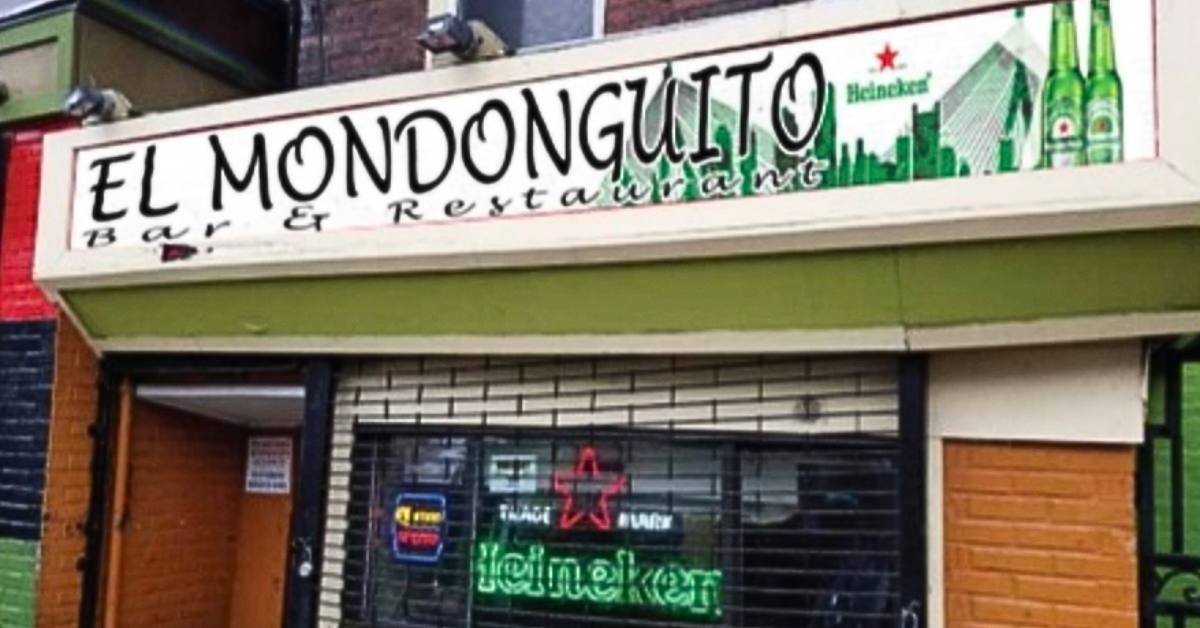ROXBURY—The pulsating sound of merengue reverberated from the jukebox. It’s a rhythmic love song playing for the crowd. Some of the customers swayed to the tune. They raised bottles of Heineken, as they laughed and plunged into the food in front of them.
It is a Sunday afternoon at El Mondonguito, a family-owned Puerto Rican restaurant and bar located in the heart of Roxbury.
“It’s always a party over here,’’ said owner Carmen Cartagena, as she served a steaming hot plate of carne guisada—beef stew. Her son, Ricky Rivera, was busily filling orders from behind the counter.
For nearly 50 years, El Mondonguito has been a staple on Dudley Street where residents get a taste of San Juan. It’s not just about the food or the socializing. El Mondonguito, adorned in original Puerto Rican street art and murals, transports people back to their island homeland.
But the past three years have not always been good for the restaurant. Hidden amid a whirl of activity on the busy stretch, the restaurant has weathered a grueling pandemic, financial instability, and creeping gentrification that has threatened other small businesses nearby.
But in recent months, El Mondonguito has seen a resurgence. Patrons have returned, sales have gone up, and the spirit of the community is back.
“El Mondonguito reminds people of home,” said Rivera, who co-owns the restaurant with his mother. “The food in the food warmer, the music, the decorations—this is exactly what [home] looks like.”
Cartagena and her late husband Domingo Rivera bought the restaurant—the site of an old barber shop—in 1974. They named it Mingo & Carmen, after their own names.
Since then, the restaurant has emerged as a go-to spot for much of the local Roxbury community. Some people travel from as far away as Medford, Revere, and Waltham to sample authentic Puerto Rican and other Caribbean food.
After Domingo Rivera passed away, Cartagena and Ricky Rivera kept the restaurant running. They enjoyed some relatively smooth years, but the pandemic hit El Mondonguito hard. Patrons had stopped coming, money had dried up, and the music stopped.
“We didn’t know if we would be able to make it through,’’ said Rivera.
He explained that, during the pandemic, state restrictions aimed at keeping the public safe were actually damaging to his establishment, such as not being able to sell alcohol that could be consumed inside the restaurant and bar. His customers came in to buy beer, rum, and other liquor, but they were not allowed to stay.
El Mondonguito operates under a hybrid model—it serves traditional meals during the day but transforms into a bar after 10 p.m., complete with games of dominoes, a jukebox, and dancing.
The neighborhood has also seen a huge transformation as rent increased and residents began leaving for more affordable dwellings outside of Roxbury. More than 80 percent of Roxbury’s residents are renters and the median income in 2017 hovered under $28,000, census data shows.
The data also shows that more than half of Roxbury’s residents identify as Black while a third are foreign-born. But Cartagena and Rivera said they’ve seen more East Asians and Caucasians recently move in and make Roxbury home.
As rent increases across the neighborhood, more locals are being pushed out of the area. Rivera said he has seen changes among the businesses as well.
“When I was growing up … there were a lot more mom-and-pop stores. Now, it’s mostly corporate stores,” Rivera said. “They even want to build a BJ’s, which is bad for smaller businesses.”
While there were discussions of a BJ’s opening in Roxbury nearly a decade ago, no such development was ever started. Still, with the South Bay Shopping Center bustling nearby, Cartagena and Rivera worry about large franchises moving to Roxbury.
“We’re here as long as the landlords can be,” Rivera said. “But if someone richer comes along, then we’re out.”
The mother and son duo said running the restaurant together has been a blessing—and a curse at times—especially after the death of Domingo Rivera.
“I help out, but my son is really the manager. He knows everything about this place,” Cartagena said with a laugh, placing one hand on the shoulder of her much taller son.
It’s a long workday for the duo, as the restaurant opens at 10:30 a.m. and closes at 1 a.m. on Sundays. Cartagena and Rivera always arrive around 9 a.m. to prepare the store for customers.
“Owning a restaurant with my mom can be very hard sometimes because we’re from two different generations,” Rivera said. “There are certain things she wants to keep that I think are outdated. But I’m also happy that we get to spend time with each other.”
As Rivera spoke, a loud cheer erupted from one of the tables in the back, followed by claps and more shouts. A live baseball game displayed on one of the large television screens was in full motion—a tight competition between Colombia and Curacao in the Caribbean series.
Cartagena and Rivera turned their attention to the line that had formed behind the counter, more eager customers were streaming in for their fix of arroz y habichuelas or the restaurant’s famed Puerto Rican specialty, mofongo.
The future is uncertain for Roxbury, as massive corporations continue their descent into the neighborhood.
But for now, it’s just another Sunday at El Mondonguito.
This story was published as part of a collaboration between MA Latino News and Boston University’s Department of Journalism in the College of Communication. The student journalist is a member of a Reporting in Depth class taught by former Boston Globe reporter Meghan Irons.
Natalia Madera is 20 years old and from New York City. She is a junior studying journalism on a pre-law track, with dreams of working in entertainment law. A Dominican-American, she aims to uplift the Latinx community through her writing and advocacy.
